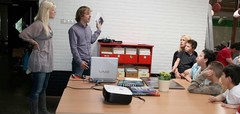Understandably, primary schools often focus mainly on teaching their students the staple topics of Maths, Science and reading and overlook the fact that astronomy is actually an extremely useful tool for introducing all these subjects. Astronomy is everywhere around us and is therefore easy to implement in the classroom. Additionally, astronomy sparks the imagination of young children and can incite a curiosity about science and technology that often stays with these children throughout their school careers. However, a lot of teachers feel that they don’t have the 'know-how' to use astronomy in their classrooms. That’s where the EU Universe Awareness (EU-UNAWE) programme comes in with the new 'Duo Internships' project!
In the Netherlands, EU-UNAWE has received a grant of twenty thousand euros from the Gratama Foundation and Leiden University Funds to implement an educational project in Rotterdam called 'Duo Internships'. During this project astronomy students from Leiden University will work together with apprentice teachers from the Teacher School (PABO) in Rotterdam.
Together this team of aspiring astronomers and teachers will develop astronomy educational materials and activities to be implemented in the classrooms of selected primary schools in Rotterdam. This innovative approach will help upcoming teachers bring science to their students in modern and engaging ways, and will encourage young children, particularly those from underprivileged backgrounds, to take an interest in science and technology and foster their sense of global citizenship from the earliest age. The astronomy students will have direct contact with teachers and children from the local schools, which will help them to strengthen their communication skills. The combination of astronomy student and training teacher guarantees a high level of quality, both scientifically and pedagogically.
This project will be implemented in collaboration with the City of Rotterdam and PABO Rotterdam. It will follow a similar UNAWE programme that was implemented in 2009, find out more about this at the Dutch UNAWE website (in Dutch only).













